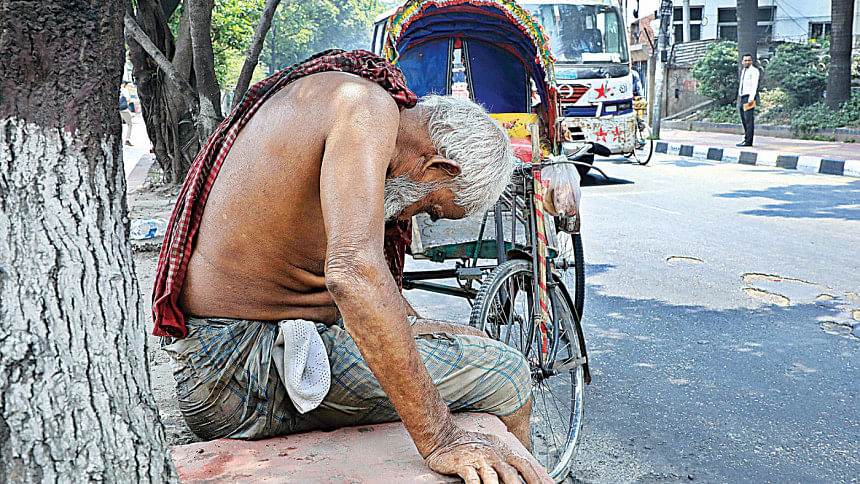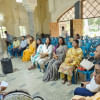Can Bangladesh protect its senior citizens?

Ensuring income security for people in old age is a crucial dimension of the UN common agenda of social security and universal social protection for all. The rights of older people to social security and to an adequate standard of living are laid down in the major international human rights instruments such as the Universal Declaration of Human Rights (UDHR), 1948, and (in more general terms) in the International Covenant on Economic, Social and Cultural Rights (ICESCR), 1966.
The International Labour Organization (ILO) Convention No. 102 on social protection minimum standards; Convention No. 128 on invalidity, old-age and survivors' benefits and its accompanying Recommendation No. 131, and Recommendation No. 202 on social protection floors together provide an international reference framework for pensions and other social security benefits to ensure income security, as well as access to healthcare, in old age.
They state that adequate old-age pensions should be provided at guaranteed levels, upon completion of a qualifying period, and regularly adjusted to maintain pensioners' purchasing power until the beneficiary's death. Pensions can be provided through contributory schemes and/or by universal or "means-tested" non-contributory schemes. Contributory pensions should ensure income maintenance by guaranteeing at least minimum compensation rates corresponding to a prescribed proportion of an individual's past earnings, or minimum benefit levels.
Non-contributory pensions, including "means-tested" old-age pensions, should guarantee that the provision offered is at least sufficient to maintain the family of the beneficiary in health and decency. Together, these benefits should guarantee a national social protection floor that secures a dignified life in old age as part of comprehensive social protection systems that also provide higher levels of pensions. Social protection floors are nationally defined sets of basic social security guarantees that should ensure, as a minimum, that, over the life cycle, all people in need have access to essential health care and to basic income security which together secure effective access to goods and services defined as necessary.
Public pension schemes have proven to be effective in ensuring adequate levels of income security for older people, as well as in combating poverty and social inequality. Most countries have progressively added additional components to their systems to guarantee minimum pensions and, in certain cases, established supplementary mechanisms aimed at securing higher levels of benefits.
Bangladesh is undergoing a significant demographic shift, the proportion of older people rising to 9.29 percent in 2022 from 7.47 percent in 2011, according to the latest population census, indicating a fast-ageing population. In absolute numbers, Bangladesh has about 15 million people aged 60 and above; by 2050, this number will have more than doubled to 36 million.
Bangladesh has a complex legislative framework for protection of the rights of elderly persons. Major regulatory instruments include National Policy on Older Persons 2013, Maintenance of Parents Act 2013, National Committee on Older Persons 2017, Action Plan to implement the National Policy on Older Persons 2013, and draft of Probin Unnayan Foundation Act 2017. The constitution of Bangladesh in its article 15(D), declares the introduction of a social security programme for the elderly population.
Bangladesh has implemented a wide range of social security programmes that have strong coverage for the protection and care of the older population such as a pension system, retirement benefits and other initiatives under the National Social Security Strategy (NSSS), such as Old Age Allowance, Allowance for Freedom Fighters, Allowance for Widow and Husband Deserted Women, Vulnerable Groups' Feeding (VGF). A vast number of older people remain outside from these programmes.
To further augment protection of older persons, the Government of Bangladesh initiated a Universal Pension Scheme 2023 inaugurated by the Prime Minister of Bangladesh on August 17, 2023. This scheme is a pathway to self-sustained retirement for citizens. Even individuals with modest incomes can prepare for a self-sustained retirement within their financial capabilities. Four distinct pension schemes have been introduced: Progoti, Surokkha, Somota, and Probash. Progoti targets employees of private companies, Surokkha caters to those in the informal sector such as farmers and labourers, Somota focuses on individuals living below the poverty line, and Probash encompasses Bangladeshi citizens living abroad.
When implementing a universal pension scheme (UPS) in Bangladesh, governance, and building accountable fund management, and digital integration will be important. Secondly, targeting of beneficiaries including dealing with the diverse population and the prevalence of the informal sector needs to be taken into account.
The universal pension scheme and other future contributory social protection schemes will have far-reaching impacts on the lives of Bangladeshi citizens, providing financial security from birth to old age, encouraging greater participation in pension programmes. The ILO and the UN system in Bangladesh will continue to provide support as needed in further developing these systems for the benefit of all.
Tuomo Poutiainen is the ILO Country Director for Bangladesh.
Follow The Daily Star Opinion on Facebook for the latest opinions, commentaries and analyses by experts and professionals. To contribute your article or letter to The Daily Star Opinion, see our guidelines for submission.

 For all latest news, follow The Daily Star's Google News channel.
For all latest news, follow The Daily Star's Google News channel. 










Comments